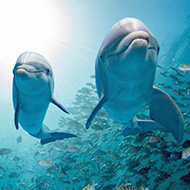Stranded dolphins' brains show classic markers of Alzheimer's disease

“These are significant findings that show, for the first time, that the brain pathology in stranded odontocetes is similar to the brains of humans affected by clinical Alzheimer’s disease" - Dr Mark Dagleish, University of Glasgow.
Researchers in Scotland have discovered that the brains of stranded dolphins show the classic markers of Alzheimer's disease in humans.
The study, published in the European Journal of Neuroscience, was conducted by the University of Glasgow in collaboration with the Universities of St Andrews and Edinburgh and the Moredon Research Institute.
Scientists believe their results could explain the underlying cause of live-stranding events that are not always clear. They also confirm the 'sick leader' hypothesis, by which an otherwise healthy animal pod finds itself in dangerously shallow waters following the loss of a group leader that may have become confused.
In the study, researchers analysed the brains of 22 odontocetes that had been stranded in the coastal waters of Scotland, including Risso’s dolphins, long-finned pilot whales, white-beaked dolphins, harbour porpoises and bottlenose dolphins. Four of the five dolphin species showed some brain alterations associated with human Alzheimer's disease.
In particular, three species had amyloid-beta plaques and several other dementia-related pathologies in their brains, suggesting that some odontocete species develop Alzheimer’s-like neuropathology. However, the authors stress their findings cannot confirm whether the animals would have suffered from the same cognitive deficits associated with clinical Alzheimer’s disease in humans.
Dr Mark Dagleish from the University of Glasgow and lead researcher, said: “These are significant findings that show, for the first time, that the brain pathology in stranded odontocetes is similar to the brains of humans affected by clinical Alzheimer’s disease.
“While it is tempting at this stage to speculate that the presence of these brain lesions in odontocetes indicates that they may also suffer with the cognitive deficits associated with human Alzheimer’s disease, more research must be done to better understand what is happening to these animals".
Professor Tara Spires-Jones, University of Edinburgh, said: “We were fascinated to see brain changes in aged dolphins similar to those in human ageing and Alzheimer’s disease. Whether these pathological changes contribute to these animals' stranding is an interesting and important question for future work”.



 RCVS' Mind Matters Initiative (MMI) has launched round two of its veterinary mental health research grants.
RCVS' Mind Matters Initiative (MMI) has launched round two of its veterinary mental health research grants.